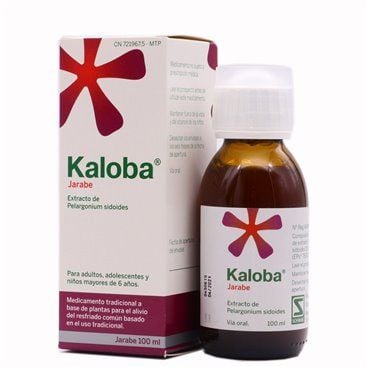Kaloba Syrup 100Ml
KALOBA syrup is a syrup made from the root extract of Pelargoniuminados DC (1: 8-10) (EPs® 7630), dried. Extraction agent: Ethanol 11% (m / m) is indicated for the relief of the common cold based on traditional use.
KALOBA syrup is a syrup made from the root extract of Pelargoniuminados DC (1: 8-10) (EPs® 7630), dried. Extraction agent: Ethanol 11% (m / m) is indicated for the relief of the common cold based on traditional use.
Kaloba (Syrup 1 Bottle 100 Ml)
Pelargoniumídos extract
INDICATIONS
- Symptomatic treatment of [COMMON COLD] in adults, adolescents and children> 6 years.
Its use is based exclusively on traditional use.
POSOLOGY
Syrup:
- Adults and adolescents> 12 years: 7.5 milliliters 3 times a day (morning, afternoon and night).
- Children 6-12 years: 5 milliliters 3 times a day (morning, afternoon and night).
- Children <6 years: not recommended.
- Elderly: no specific dosage recommendations have been made.
Duration of treatment : continue treatment for 7 days, being able to extend 2-3 additional days to avoid relapses. In case the symptoms continue or worsen after 7 days, consult with the doctor. The maximum duration is 14 days.
Missed dose : administer the next dose at the usual time. Do not double the next dose.
DOSAGE IN KIDNEY INSUFFICIENCY
No specific dosage recommendations have been made. Its use is contraindicated in severe kidney disease.
DOSAGE IN LIVER INSUFFICIENCY
No specific dosage recommendations have been made. Its use is contraindicated in severe kidney disease.
RULES FOR CORRECT ADMINISTRATION
- Syrup: take with some liquid in the morning, noon and night.
Administration with food: can be taken with or without food.
CONTRAINDICATIONS
- Hypersensitivity to pelargonium or any other component of the drug.
- Patients with severe bleeding or high bleeding tendencies (see Precautions; Coagulation disorders).
- Concomitant treatment with anticoagulants (see Interactions; anticoagulants).
- Serious liver or kidney disease.
PRECAUTIONS
- [HEPATOTOXICITY]. Cases of hepatitis have been described after the use of Pelargonium. In case of suspected hepatotoxicity, discontinue treatment and monitor liver function.
- [DISORDERS OF COAGULATION]. Pelargonium may promote bleeding, so it should be used with caution in patients with a tendency to [BLEED].
ADVICE TO THE PATIENT
- Consult your doctor if symptoms continue after 7 days of treatment, or if new symptoms appear such as high or persistent fever, difficulty breathing or bloody mucus.
- Tell your doctor and / or pharmacist if you experience any of these symptoms:
* Sharp and severe pain in the upper right part of the abdomen, nausea and vomiting, loss of appetite, unexplained tiredness, darkening of the urine or the appearance of a yellowish tinge to the skin or the whites of the eyes.
SPECIAL WARNINGS
- Monitoring:
* Liver function in patients with symptoms of liver damage.
INTERACTIONS
- Oral anticoagulants. Pelargonium could alter blood clotting, favoring the appearance of hemorrhages. Contraindicated use.
PREGNANCY
Animal safety: no data available.
Safety in humans: There are no adequate and well-controlled studies in humans. Its use is not recommended during pregnancy.
Effects on Fertility: No specific studies have been performed in humans.
LACTATION
Animal safety: no data available.
Safety in humans: it is not known whether its components are excreted with milk, and the consequences they could have for the infant. Its use is not recommended during lactation.
KIDS
Authorized in children and adolescents from 6 years of age, with the corresponding dosage adjustments (see Dosage).
Safety and efficacy have not been evaluated in children <6 years of age, so it is recommended to avoid its use.
SENIORS
No specific problems have been described in the elderly that require a dosage adjustment.
EFFECTS ON DRIVING
No studies have been performed, although it is unlikely that it may affect driving.
ADVERSE REACTIONS
Adverse reactions are described according to each frequency range, being considered very common (> 10%), common (1-10%), uncommon (0.1-1%), rare (0.01-0.1%) , very rare (<0.01%) or of unknown frequency (cannot be estimated from the available data).
- Digestive: infrequent [ABDOMINAL PAIN], [GASTRIC HYPERACIDITY], [NAUSEA], [DIARRHEA].
- Hepatic: frequency unknown [HEPATOTOXICITY], [HEPATITIS].
- Allergic: rare [HYPERSENSITIVITY REACTIONS], with [EXANTEMATIC ERUPTIONS], [URTICARIA], [PRURITO]; very rare facial edema, [DYSNEA] or [HYPOTENSION].
- Hematological: rare [GINGIVAL HEMORRHAGE], [EPISTAXIS].
OVERDOSE
Symptoms: no cases have been described.
Measures to take:
- Antidote: there is no specific antidote.
- General disposal measures: have not been established.
- Monitoring: clinical status of the patient and liver function.
- Treatment: symptomatic.



